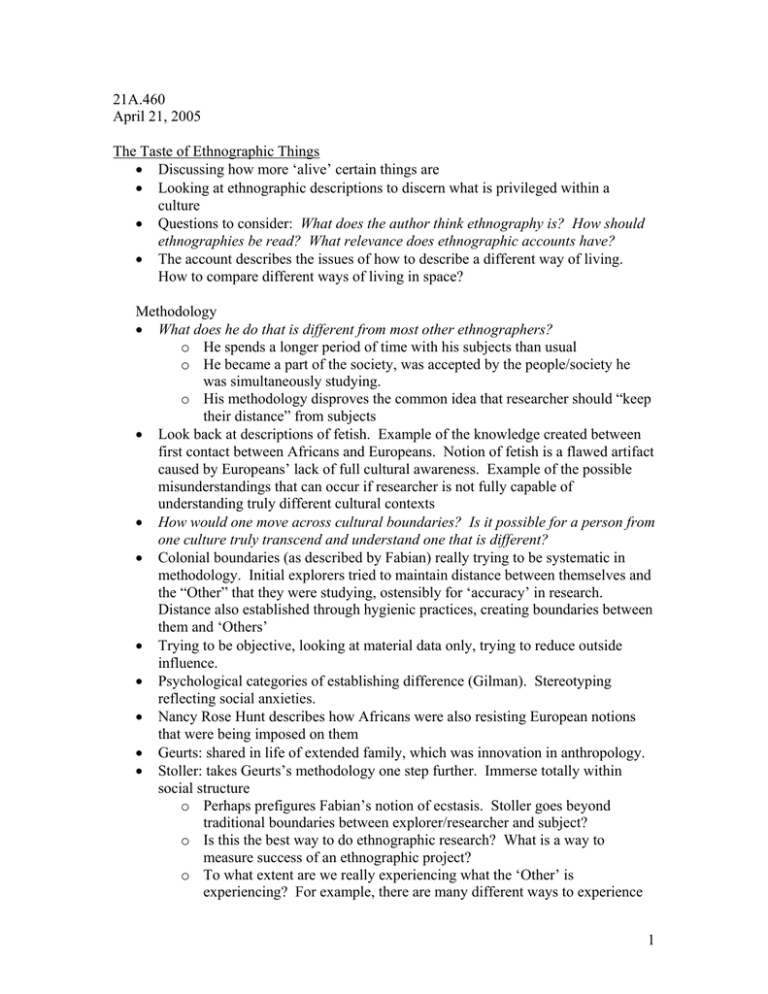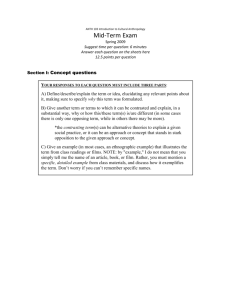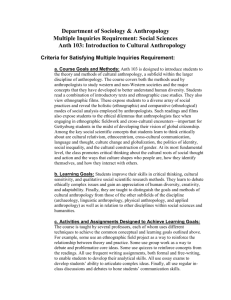21A.460 April 21, 2005 The Taste of Ethnographic Things
advertisement

21A.460 April 21, 2005 The Taste of Ethnographic Things • Discussing how more ‘alive’ certain things are • Looking at ethnographic descriptions to discern what is privileged within a culture • Questions to consider: What does the author think ethnography is? How should ethnographies be read? What relevance does ethnographic accounts have? • The account describes the issues of how to describe a different way of living. How to compare different ways of living in space? Methodology • What does he do that is different from most other ethnographers? o He spends a longer period of time with his subjects than usual o He became a part of the society, was accepted by the people/society he was simultaneously studying. o His methodology disproves the common idea that researcher should “keep their distance” from subjects • Look back at descriptions of fetish. Example of the knowledge created between first contact between Africans and Europeans. Notion of fetish is a flawed artifact caused by Europeans’ lack of full cultural awareness. Example of the possible misunderstandings that can occur if researcher is not fully capable of understanding truly different cultural contexts • How would one move across cultural boundaries? Is it possible for a person from one culture truly transcend and understand one that is different? • Colonial boundaries (as described by Fabian) really trying to be systematic in methodology. Initial explorers tried to maintain distance between themselves and the “Other” that they were studying, ostensibly for ‘accuracy’ in research. Distance also established through hygienic practices, creating boundaries between them and ‘Others’ • Trying to be objective, looking at material data only, trying to reduce outside influence. • Psychological categories of establishing difference (Gilman). Stereotyping reflecting social anxieties. • Nancy Rose Hunt describes how Africans were also resisting European notions that were being imposed on them • Geurts: shared in life of extended family, which was innovation in anthropology. • Stoller: takes Geurts’s methodology one step further. Immerse totally within social structure o Perhaps prefigures Fabian’s notion of ecstasis. Stoller goes beyond traditional boundaries between explorer/researcher and subject? o Is this the best way to do ethnographic research? What is a way to measure success of an ethnographic project? o To what extent are we really experiencing what the ‘Other’ is experiencing? For example, there are many different ways to experience 1 • • • • • • time, space, etc (in Spanish, the concept of time is measured in terms of quantity, not length, as in English) o What are the limits/possibility of truly understanding the other? o Should anthropology try to do that? Ethically, is this what ethnographers should be doing? Outsider insight has the advantage of having an outside perspective to compare and evaluate. However the full lived experience could offer more accurate descriptions of actual experiences with phenomena. o Both are valuable, but the pros and cons of each need to be balanced and considered when doing research Stoller: had long-term engagement that he considered necessary to fully understand his subjects He took an activist position and critically engaged with the people Boundary between himself as academic observer and advocate for people he was working with is blurred. He went beyond classical anthropology Methods of classical anthropology: researcher goes to a small, closed community, usually in areas considered ‘primitive,’ or at least isolated from ‘civilization’ to minimize outside influence. There, the researcher would study classic topics like kinship patterns, spatial arrangement of houses, buildings, and communal spaces. o This method of research is difficult, if not impossible, to do now. Societies across the world are rapidly becoming more and more complex, evolving with the influence of increasing globalization. There are few, if any, truly ‘closed’ societies that have not been exposed to global social forces o Anthropology has been evolving its methods, subjects of study, and terminology used (such as culture, kinship, etc) o Classical anthropology is no longer a valid model to use anymore What anthropology considers culture is evolving – it’s not a purely academic term anymore Story of sorcerer meeting Cassie: did you believe it? Was it convincing? • Yes, in general. • The account was critically engaged with its subject. He only ended up believing it after asking questions, challenging the premises, so it was believable since he was not blindly accepting • Had no experience with his world or experience in his body, so almost have no right to be skeptical (it was an account of his version of reality) • It appeared that he really was communicating with the woman Can even psychological behavior be adopted? • By his account, it seems possible that psychological behavior is a cultivated sense Merleau-Ponty: philosopher/phenomenologist writing in the 1940s-50s • Strongly influential on experiential phenomena in anthropology 2 • • • Posited that person can experience other ‘realities’ freshly, other than the one he was born into, through direct observation and awareness of embodied forms of knowing. Using this method, it is possible to resolve where the “so-called West” is, what its particular ‘realities’ are Stoller, Geurts contend that there is another way to experience reality other than phenomenologically o The vignettes present within their works reveal a lot about social inequalities and how Africans resist. In other words, there is another way to read culture – through the perspective of a member of the culture What was he trying to tell in the Bush-taxi story? o He was using story to describe the social space o Putting stories side by side to show how categorizing works in social structure are used in day to day life. Older patterns of social behavior have evolved to incorporate something relatively new and modern like the bush taxi o His account asserts the notion that extensive time living and experiencing life in a different context is necessary to learn sensitivity in order to pick up on reality • • • People are socialized into a certain social reality at a certain point, people eventually reproduce that social order To what extent can people resist this socialization? Is resistance merely another manifestation of social order? Main point: there are different ways of existing in space that are fundamentally different from one another, although it is not impossible for a person from one to lean the perspective of the other Ways in which society can have different realities • Stoller: Sound is important in this culture, privileged above many senses, unlike in Western societies • Sound is important in concepts of possession and sorcery • Geurts: argues that kinaesthesia, or ways of moving through space, was an important ‘sense’ in its own right, which is a fundamentally different view than in most Western contexts • Stoller: argues that emphasis was on sound and tactile sensations as primary. Instruments are seen as voices and can call things into visual sphere. Movie: Divine Horsemen: Living Gods of Haiti • Deals with possession, performance during possession, and after-possession state • Maya Deren filmed this movie between 1947-1951: similar in style to Jean Rouch, who spent life recording life in Africa o Born in Ukraine (1917-1971) o Was an initiate of Haitian Vodou • Deals with issues of spirit possession. 3 • • • Self versus collective experience Distinctions are blurred between “reality” and state of being Vodou worship constructed as worshipping common moral principles together o Loa: spirits Legba: spirit whose role is link between this world and other. Should be saluted in ritual to achieve contact and connection with other world o Crossroads drawn on ground are symbolic juncture where communication between worlds is initiated o Center post in ceremonial space is where all ritual motions revolve o Deities are seen to play a protective role Ceremony • Crossroads drawn on ground • Priest’s assistant metaphorically battles with priest at start of ceremony as sign of battling loas to communicate • Priest (houngan) has responsibility to congregation as well as to the god. Position gives economic, political, and social authority in society to provide advice • Possession is phenomena when a divinity becomes manifest • Loa is seen to ‘mount’ the person during possession – metaphor of ‘horse and rider’ with spirit being the ‘rider’ in control of his ‘horse’ Divinities: • Snake spirit: source of all knowledge • In divinity worship, important to note that it is the spirit worshipped, not the thing the spirit is manifested in (ie the sea spirit is venerated, not the sea itself) • Agwe: ritual done by female priest, most elaborate ritual undertaking • What defines humans is ability to conceive beyond reality, conceive of divinity, desire beyond need, which is represented through divinity worship • Woman goddess represents capacity to conceive of divinity (in mental sense): often associated with Virgin Mary • Ogoun: hero type, often political figure. Responsibility for healing, prophecy, magic • Catholic litany precedes Vodou ceremonies. Libations poured as sign of respect. Spirits are embodiments of people (Stoller) • Spirits are interested to see children born healthy, with an immortal soul • Spirits can show up unannounced • There is a symbiotic relationship between spirits and worshippers, even intimate relationship o There are reciprocal obligations between gods and servants • Psychic contact made with/through left hand • Possession by a spirit is marked by unusual behavior of person – violent, chaotic movement is sign of inner conflict, struggle between loa and person. However, loa is master and will eventually take over the body, making it move beyond what it normally could 4 • • • • • • History of Vodou: people from Congo transplanted to Haiti as slaves. Known for elegance in movement, dance. Influence in dance moves can even be seen in modern day jazz Form and function of dance is religious, not secular Petro loa: god of aggressive actions o Origins of the spirit was rage at the treatment of Africans in slavery Cross is symbol of life and death Gede: lord of erotic. Erotic forces seen as inevitable, so therefore beyond good and evil. Amused at the pretense that erotic can be anything else Ra-Ra festival: festival for spring, always during Lent. Dancers twirl batons, perhaps in place of weapons – suggest hunting festival. Represents hope for a fresh start, a clean beginning. 5 MIT OpenCourseWare http://ocw.mit.edu 21A.460J / WGS.620J Medicine, Religion and Politics in Africa and the African Diaspora Spring 2005 For information about citing these materials or our Terms of Use, visit: http://ocw.mit.edu/terms.






